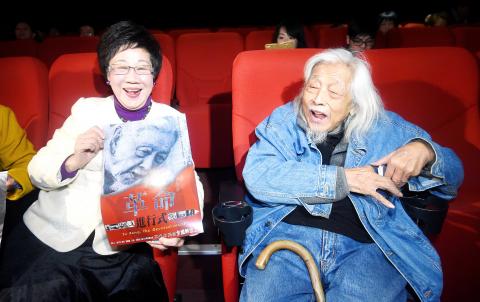An audience of more than 100 people — including long-term Taiwan independence advocate Su Beng (史明) and former vice president Annette Lu (呂秀蓮) — responded with laughter and tears during the premiere of The Revolutionist (革命進行式), a documentary on Su.
“My life is full of surprises — I am very surprised actually that people would make a movie about my life,” Su told reporters before the screening.
Born and raised in a wealthy family in Taipei’s Shilin District (士林), Su said his family hoped that he would go to medical school, become a doctor and lead a stable life.

Photo: Liu Hsin-de, Taipei Times
However, Su considered that lifestyle “boring,” and ran away from home to attend Waseda University in Tokyo, becoming a Marxist while studying political science there.
He then left for China to join Chinese Communist Party (CCP) troops battling Japanese invaders.
Witnessing brutal murders by communist soldiers, Su decided that the CCP was deviating away from true Marxist ideology, and escaped from China with his Japanese girlfriend, Kyoko Hiraga — whom he met in China — to Taiwan.
Because of his activities against the then-authoritarian Chinese Nationalist Party (KMT) regime, he was again forced to leave Taiwan for Japan.
In Japan, he opened a restaurant and secretly trained young Taiwanese independence activists; he also wrote a classic account of Taiwan’s history.
Although the restaurant was profitable, he used most of his money to sponsor political activism in Taiwan.
Hiraga eventually left him, after more than 20 years together.
For the first time, Hiraga appeared onscreen in an interview in the documentary.
“After we broke up, I gave her a store so that she could collect the rent, and we still got together and chatted from time to time,” Su said. “You know, everyone has something in the past that he or she would always keep in mind.”
Su said that even though the team has traveled with him around Taiwan and Japan to film: “It is regrettable that we cannot go to China to film.”
“Fortunately, there are some photographs with which I could remember my eight years in China,” he added.
The documentary is to hit theaters nationwide on Feb. 26.

A strong continental cold air mass is to bring pollutants to Taiwan from tomorrow, the Ministry of Environment said today, as it issued an “orange” air quality alert for most of the country. All of Taiwan except for Hualien and Taitung counties is to be under an “orange” air quality alert tomorrow, indicating air quality that is unhealthy for sensitive groups. In China, areas from Shandong to Shanghai have been enveloped in haze since Saturday, the ministry said in a news release. Yesterday, hourly concentrations of PM2.5 in these areas ranged from 65 to 160 micrograms per cubic meter (mg/m³), and pollutants were

Taiwan’s armed forces have established response protocols for a wide range of sudden contingencies, including the “Wan Chun Plan” to protect the head of state, the Ministry of Defense (MND) said today. After US President Donald Trump on Saturday launched a series of airstrikes in Venezuela and kidnapped Venezuelan President Nicolas Maduro, concerns have been raised as to whether China would launch a similar “decapitation strike” on Taiwan. The armed forces regularly coordinate with relevant agencies and practice drills to ensure preparedness for a wide range of scenarios, Vice Minister of National Defense Hsu Szu-chien (徐斯儉) told reporters before a

EVA Airways on Saturday said that it had suspended a pilot and opened an investigation after he allegedly lost his temper and punched the first officer several times as their plane was taxiing before takeoff at Los Angeles International Airport. According to a report published on Thursday by The Reporter, the incident occurred after the flight’s Malaysian first officer tried to warn the Taiwanese pilot, surnamed Wen (文), that he was taxiing faster than the speed limit of 30 knots (55.6kph). After alerting the pilot several times without response, the first officer manually applied the brakes in accordance with standard operating

Japanese Councilor Hei Seki (石平) on Wednesday said that he plans to visit Taiwan, saying that would “prove that Taiwan is an independent country and does not belong to China.” Seki, a member of the Japan Innovation Party, was born in Chengdu in China’s Sichuan Province and became a naturalized Japanese in 2007. He was elected to the House of Concilors last year. His views on the Chinese Communist Party (CCP) — espoused in a series of books on politics and history — prompted Beijing to sanction him, including barring Seki from traveling to China. Seki wrote on X that he intends